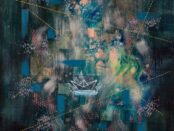Limitations and rules can boost your creativity.
Many classic tracks were made with very limited resources, and the deciding factor in them being special is the involuntary limits imposed. Removing options forces your mind to find new alternatives. It focusses your mind on what is available to use and how.
A simple and obvious example is to say: “Write a piece of music using only one chord”. – Stockhausen did precisely that in Stimmung (if you want to check it out there’s a decent version on youtube here, although the classic recording is the Singcircle version).
You might even go a step further and say to write a piece using only one note…well Ligeti got there first with his cello concerto (forecast 55 years before by Schoenberg, as klangfarbenmelodie or “tone-colour-melody”).
If someone gave you one minute to write a short (few sentences) story about any subject you like would you struggle to do it? I would. But if someone gave you a minute to write a super-quick story about a man who wakes up with baguettes instead of arms…well suddenly i can see him waking terrified and confused…but eventually out of despair, offering up his bread-arms as breakfast to the staving locals…only to find his bread-arms grow back with each day he feeds the workers…turns out they are building a church, and when the church is completed and the workers stop working, he awakes to find his arms as flesh and blood again. They erect a sculpture of him, carved by a local artist above the entrance of the chapel.
Ok, it’s not a work of genius, but I can’t come up with stories just like that…the limit I imposed on my thought process stimulated the new ideas.
This is a quite extreme example, though. Even a small restriction can have knock on effects. Try removing an option from your workflow, or creative process. It can be a simple thing like you cannot use a snare sound or the note “F”. Or you might want to be more hardcore and decide that you will make up some tougher rules….such as each track you are recording on can only use one note at a time, or you can only use one instrument, or your track must sound the same forwards and backwards.
Don’t worry about what your rules mean…the only important thing is to break your routine and force yourself to think in new ways about what you create.
Make Better Music is updated every Tuesday. Catch up here.
Image: Francesco Marino / FreeDigitalPhotos.net

David Learnt composition (harmony, counterpoint and orchestration) to degree level through studying Schoenbergs Fundamentals of Musical Composition, the classic text on twentieth century harmony by Vincent Persichetti, Henry Mancini’s Sounds and Scores, Rimsky-Korsakov’s excellent books on orchestration as well as studying any scores that intrigued me. He is a founder member of two bands, avant pop duo Cnut, and orchestral doombience outfit Regolith, and have performed across Europe with them.


















